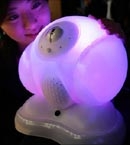The new modern wireless headphones can detect potential heart problems while users listen to music or chat on the phone.
These headphones can “diagnose diseases” and resemble other wireless headphones used by millions of smartphone owners. They function as headphones, producing sound and featuring a built-in microphone. However, the special point is that they are equipped with high-tech sensors to measure the faint vibrations of the heartbeat.

These wireless headphones capable of detecting heart disorders were developed by the American company MindMics. (Image: mindmics.com).
These vibrations cannot be heard by the human ear but are captured by the sensors. The data is transmitted to a microchip in a handheld device. This device analyzes signs that may indicate heart disorders. The results can be reported to the smartphone of both the doctor and the user.
Tests with these wireless headphones developed by the American company MindMics show that they can also detect atrial fibrillation and clots inside the heart chambers.
The Daily Mail (UK) reported that these clots can travel through blood vessels supplying the brain, leading to strokes. Meanwhile, atrial fibrillation is responsible for 16,000 strokes annually in the UK. Treatment methods for this condition include anticoagulant medications and electrical cardioversion.
Holter electrocardiogram devices connect to electrodes to monitor the heart’s electrical activity but can be uncomfortable for users and provide limited data. Recently, the Apple Watch has also featured wrist blood measurement, converting it into heart rate. However, most of these devices can only monitor heart rates for up to 5 minutes at a time. In contrast, the headphones developed by MindMics record heartbeats continuously, second by second.
These wireless headphones are expected to hit the US market by the end of this year. Professor Francisco Leyva-Leon at Aston University (UK) commented: “The ability of these headphones to detect atrial fibrillation seems plausible. However, they need to undergo clinical validation and have a long way to go before being used in daily life.”




















































